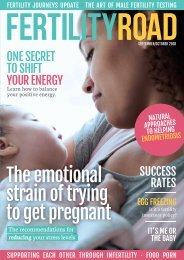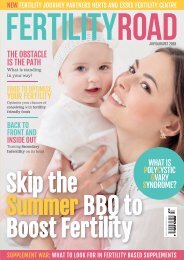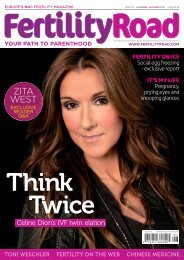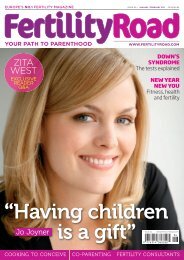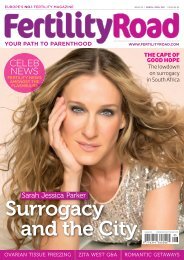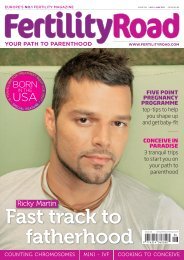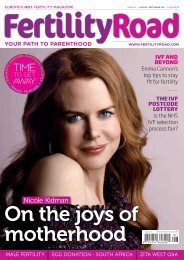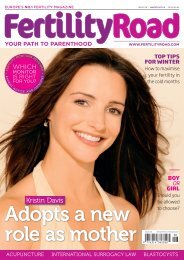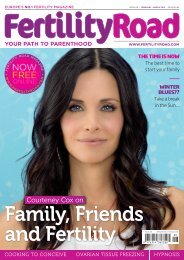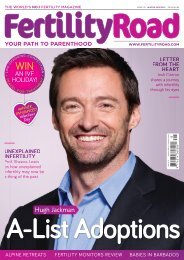Fertility Road Issue 44 May/June 2018
Fertility Road Magazine
Fertility Road Magazine
Create successful ePaper yourself
Turn your PDF publications into a flip-book with our unique Google optimized e-Paper software.
BODY<br />
Your weight can affect your fertility and<br />
depending on which type of exercise you<br />
do, it could be detrimental to your fertility<br />
chances. But also, there are actual exercise<br />
regimes that enhance your fertility too. So, if<br />
you need to lose weight to get fertility fit, I'll<br />
explain which exercises are good for fertility,<br />
but first let's review how your weight affects<br />
your fertility.<br />
If you and or your partner are experiencing<br />
infertility, it is advisable to be as healthy as<br />
you can be, to get the best out come from<br />
any fertility treatment and to have a healthy<br />
pregnancy. The NHS link exercise to fertility<br />
and research shows that if you have a healthy<br />
BMI (body mass index) between 20-25 BMI, you<br />
can improve your chances to conceive. If you<br />
are under or over weight this can affect your<br />
ability to conceive.<br />
Obese women are less likely to become pregnant<br />
through IVF and assisted reproduction.<br />
Carrying excess weight can affect the function<br />
of the ovaries, due to changes in hormones<br />
and metabolism rate. Obese women have less<br />
success with assisted fertility treatment, because<br />
of the poor response to fertility drugs that<br />
stimulate ovulation. The same can be said for<br />
being underweight, as this can also affect your<br />
hormones too and impact your fertility.<br />
Maintaining an optimum weight is good for<br />
both partners experiencing infertility, and<br />
this has been the current focus within NHS<br />
proposals. In the South West of England,<br />
they propose to refuse NHS funded<br />
IVF treatment, if the male partners<br />
have a BMI of 30 plus. As 30 plus<br />
BMI, is classed as medically<br />
obese and could affect fertility<br />
chances. The proposal by<br />
the clinical commissioning<br />
group, is to change NHS<br />
funded fertility treatment<br />
policy, to ensure men get<br />
to a healthy weight, before<br />
the NHS fund investigations<br />
and fertility treatments with<br />
their partners.<br />
So, which type of exercise<br />
workouts enhances fertility?<br />
Moderate exercising, rather than excessive,<br />
exhausting workouts, are likely to be the most<br />
appropriate type of activity, for healthy men and<br />
women trying to conceive. Studies found that<br />
women who performed high-frequency, highintensity<br />
exercise had a lower rate of fertility.<br />
A cohort study was carried out by the Norwegian<br />
University of Science and Technology, led by Dr<br />
Gudmundsdottir and his team. Which investigated<br />
the association between the levels of physical<br />
activity, and the groups fertility rates against the<br />
parity (number of children) they had in a group.<br />
Over 24,000 women participated, and women were<br />
excluded who had conditions that were known<br />
to affect their fertility, such as poor health, and<br />
fertility problems. As the study attempted to make<br />
their findings relevant to healthy women. Their<br />
levels of exercise were assessed and categorised as:<br />
• Never<br />
• Less than once a week<br />
• 2-3 times a week<br />
• Almost every day<br />
Along with the frequency of exercise, the intensity was<br />
also categorised as: ‘taking it easy’, ‘loss of breath’ and<br />
‘to exhaustion’. The group’s fertility was assessed at<br />
the follow-up assessments, where the women reported<br />
on: their age they had children; and the number of<br />
children they had; and whether they had difficulty<br />
conceiving within one year of trying for conception.<br />
Other factors that affect<br />
fertility were considered in<br />
the study to include:<br />
• Age<br />
• Marital status<br />
• Body mass index (BMI)<br />
• Smoking<br />
• Alcohol consumption<br />
The fertility status of the group were compared and<br />
the results showed that “Increased frequency and<br />
intensity of physical activity was associated with<br />
increased infertility” Results showed that “women<br />
who were active on most days of the week were<br />
3.2 times more likely to be infertile than inactive<br />
women. Women who exercised ‘to exhaustion’ were<br />
2.3 times more likely to be infertile than women<br />
who said they ‘take it easy’”.<br />
The researchers concluded that “fertility is<br />
negatively affected by physical activity of an<br />
extreme intensity and frequency”<br />
Studies show that highintensity,<br />
prolongs<br />
strenuous workouts can:<br />
• Increase cortisol levels<br />
• Lower thyroid hormones<br />
• Affect metabolism<br />
• Disturb ovulation<br />
• Menstrual cycle<br />
| fertilityroadmag | follow us @fertilityroad<br />
fertilityroad.com | 19



